Natural Mosquito Repellent Tips for This Monsoon In 2025
Why Mosquitoes Thrive During Monsoon
- In addition to being an irritation during the monsoon season, mosquitoes pose a serious risk to public health.
- Mosquito Repellent Tips When the rains come, their population soars, bringing with it a greater risk of illnesses like dengue, malaria, chikungunya, and the Zika virus.
- However, why precisely do mosquitoes flourish during the monsoon season?
- The main causes are stagnant water and elevated humidity, which provide the perfect conditions for mosquito reproduction and survival.
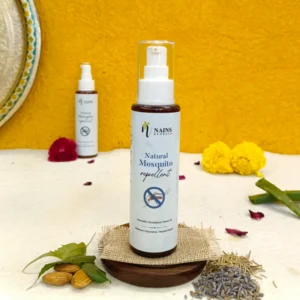
1. Increased Humidity: A Mosquito’s Best Friend
- The life cycle and activity level of mosquitoes are significantly influenced by humidity.
- In order to stay active and effective in their search for hosts, female mosquitoes in particular need a specific amount of moisture in the air.
- According to research, when relative humidity rises beyond 60%, as it usually does during the monsoon season in tropical nations like India, mosquito activity increases significantly.
- Because they are ectothermic, mosquitoes’ body temperature is influenced by their surroundings.
- In addition to helping them retain bodily fluids, high humidity enhances the performance of their sensory organs, including as antennae and maxillary palps.
- They can more easily find us as hosts thanks to these organs, which let them to detect the heat, lactic acid, and carbon dioxide that people release.
- After a big rain, people in urban, semi-urban, and rural regions frequently report an instant increase in mosquito bites on humid evenings.
- This is a breeding ground for these pests, not merely an unpleasant side effect.
- The evaporation rate of mosquito eggs and larvae is decreased by humid air, increasing the likelihood that they will survive.
- Because of the trapped moisture in the walls, mattresses, and corners, many people who live in homes with inadequate ventilation experience mosquitoes indoors for longer periods of time.
- World Health Organisation (WHO) entomologists claim that humid environments significantly boost mosquito survival rates and the possibility for vector-borne illness transmission.
- For instance, high humidity causes the principal dengue vector, Aedes aegypti, to become hyperactive, biting several hosts and quickly spreading the disease.
- Additionally, humidity affects how quickly natural repellents and pesticide sprays evaporate, making it more difficult to manage mosquito populations with traditional techniques.
- For this reason, it is advised to regularly utilise air dehumidifiers, herbal diffusers, and mosquito nets indoors during the hottest monsoon months.
- From the standpoint of public health, knowing how humidity functions us in our readiness.
- The attraction of mosquitoes indoors can be considerably decreased by installing moisture absorbers, enhancing ventilation, and purchasing humidity-monitoring equipment.
- Physical barriers like window meshes and long sleeves should be used in conjunction with natural therapies like citronella candles, neem oil diffusers, and camphor, which are more effective in low-humidity environments.
Stagnant Water: A Mosquito Breeding Paradise
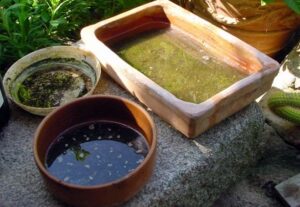
- The abundance of standing water during the monsoon is one of the main factors contributing to mosquitoes’ success.
- Still water surfaces are essential for mosquito egg laying, particularly for species like Aedes aegypti and Anopheles.
- Puddles created by monsoon showers can provide as breeding grounds in a variety of locations, including rooftops, old tires, choked drains, garden containers, potholes, and even bottle caps.
- Experts in vector control claim that mosquitoes may reproduce with just a tablespoon of standing water.
- Within 48 hours, the 100–300 eggs that a female mosquito can lay at once will develop into larvae. The larvae develop into adult mosquitoes in a little 7–10 days.
- These little pools of water are continuously refilled by the monsoon’s regular rains, providing mosquitoes with unhindered access to breeding grounds.
- The majority of homes unintentionally aid in mosquito reproduction.
- It’s common to overlook water gathered in unprotected buckets, pet bowls, AC trays, and plant pots.
- In low-lying locations, construction sites and apartment complexes with ineffective or blocked drainage systems, the situation gets worse.
- Mosquitoes are more common indoors, but people aren’t usually aware that they could be reproducing on rooftop tanks or just outside their balconies.
- Rainy weather also makes it more difficult to clean outside, which results in open bins and waterlogged trash piles, which provide mosquitoes with yet another ideal home.
- These circumstances last for weeks, if not months, and result in recurring mosquito infestations because many families forgo deep cleaning during rainy seasons.
- Awareness is the first step towards effective mosquito avoidance during the monsoon season.
- Mosquito breeding can be avoided by routinely checking and emptying water-holding containers, cleaning roof gutters, covering water tanks, and adding sand or oil to drain water.
- Communities should band together to plan cleanup campaigns during the rainy season and notify local authorities as soon as they notice waterlogging.
- A sustainable alternative is to use biological control, such as putting guppy fish in open ponds, or natural larvicides, such as citronella or neem oil, in outdoor water storage.
- Long-term safety is ensured by combining these with personal mosquito protection measures including repellents, netting, and covered clothes.
Top Natural Ingredients That Repel Mosquitoes
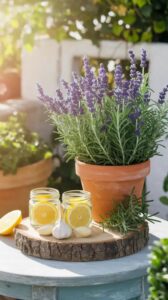
- Expert Advice on Citronella Oil, Nature’s Potent Insect Repellent:
- Citronella oil, which is extracted from the leaves and stems of Cymbopogon grass, is widely acknowledged as one of the best natural mosquito repellents.
- Citronella is categorised by the U.S. Environmental Protection Agency (EPA) as a bio-pesticide that acts in a non-toxic manner.
- Mosquito Repellent Tips Mosquitoes use human odours like lactic acid and carbon dioxide to find their victim, but its potent, lemony scent obscures these scents.
- Experience-Driven Use: Herbal sprays, candles, body lotions, and outdoor diffusers all make extensive use of citronella oil.
- During the monsoon season, people who frequently use citronella-based products have reported fewer mosquito bites, particularly while they are outside.
- It is perfect for temporary protection because it lasts for two to three hours.
- Research conducted in tropical nations such as Thailand and India demonstrates that citronella effectively deters Aedes aegypti mosquitoes.
- According to studies published in the Journal of Tropical Medicine, mosquitoes can be repelled for up to 120 minutes by formulations that contain 5–10% citronella oil.
- Before using citronella straight to the skin, always dilute it with a carrier oil, such as coconut or jojoba oil. It is advised that those with sensitive skin do a patch test.
Lemongrass – Fresh Scent with Protective Power
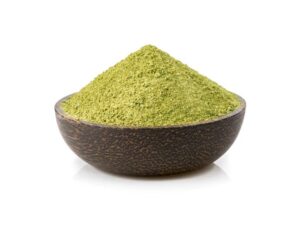
- Although lemongrass is a member of the Cymbopogon family and is sometimes mistaken for citronella, it has distinct advantages for keeping mosquitoes away. Citral and geraniol, which have insecticidal qualities, are present in it.
- Diffusers and mosquito coils frequently use lemongrass essential oil. Its invigorating aroma elevates the spirits and repels insects. Lemongrass is a common element in do-it-yourself mosquito repellents.
- When applied topically or in vapour form, lemongrass oil provides 74–95% protection against mosquito bites for more than two hours, according to a research published in Parasitology Research.
Neem Oil – Ayurvedic Remedy for Bites and Prevention

- Expert Opinion: For millennia, Ayurvedic medicine has employed neem (Azadirachta indica). Its azadirachtin-rich oil acts as a repellant and growth regulator by interfering with insects’ hormonal systems.
- Real-World Use: Neem oil combined with coconut oil is frequently applied to mosquito-prone body parts like the neck, arms, and ankles during the monsoon season. Because of its anti-inflammatory qualities, it also relieves itching bites.
- Scientific Support: Neem oil provides up to 85% protection against mosquito bites for up to three hours, according to several Indian research studies.
Eucalyptus Oil – Long-Lasting and Skin-Safe

- Because lemon eucalyptus oil contains PMD (para-menthane-3,8-diol), a substance as potent as DEET, it is a powerful repellent. Lemon eucalyptus oil should not be mistaken with ordinary eucalyptus.
- Because it is less harsh than chemical alternatives and provides protection for up to six hours, eucalyptus oil is preferred in mosquito-repellent sprays and creams for both adults and children.
- In regions with a high prevalence of mosquito-borne illnesses, the World Health Organisation suggests using lemon eucalyptus oil as a natural substitute for artificial repellents.
Camphor – Traditional Home Remedy

- This solid white substance, which is made from the wood of the camphor tree, is used in Ayurveda for its purifying and detoxifying qualities. When burned or vaporised, it also has the capacity to keep insects away.
- Daily Use: It is customary in Indian houses to ignite camphor in the evenings during the monsoon season. Mosquitoes are also deterred from entering buildings by placing camphor tablets in closets or corners.
- Scientific Support: Compounds in Camphor’s fumes disrupt mosquitoes’ olfactory receptors, making it more difficult for them to follow people.
DIY Mosquito Repellent Ideas You Can Try at Home
- During the monsoon season, a lot of individuals are using homemade natural mosquito repellents due to rising worries about the negative effects of chemical repellents.
- In addition to being safe and affordable, these natural medicines are also environmentally friendly and frequently more enjoyable to use.
- Here’s how to successfully repel mosquitoes with items from your garden or kitchen, whether it’s an incense stick, candle, or spray.
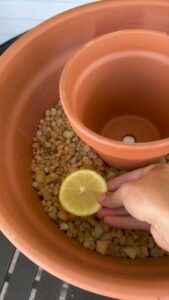
- Essential Oil-Based Natural Spray:
- A natural spray produced with essential oils is among the simplest and most efficient do-it-yourself insect repellents.
- Oils with known mosquito-repelling qualities include citronella, lemongrass, eucalyptus, peppermint, and neem.
- The volatile molecules included in these essential oils, such as citral, geraniol, and limonene, irritate or block the mosquito’s olfactory receptors, making it impossible for them to detect human presence.
- How to Produce It:
- Take 100 millilitres of purified water.
- Add 20 to 25 drops of essential oil of eucalyptus or citronella.
- Add 1 tablespoon of vodka or witch hazel, which serves as an emulsifier and preservative.
- For extra protection, feel free to add a few drops of neem oil.
- Before each use, pour into a spray container and mix thoroughly.
- A lot of folks have made this homemade spray a regular part of their monsoon regimen.
- It can be sprayed on window sills, clothing, curtains, and skin (after patch testing).
- In contrast to store-bought repellents, this spray is free of synthetic toxins and has a pleasant scent.
- When appropriately diluted, this spray is safe to use around kids and pets.
- When used properly, essential oils are recognised by the EPA and WHO as safe biopesticide substitutes.
- For anyone with respiratory disorders or sensitive skin, it’s a fantastic choice.
Mosquito-Repelling Candles
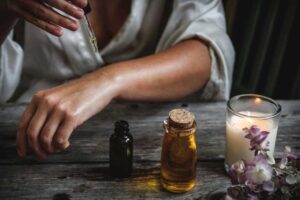
- In addition to lighting up your house, candles with oils that repel mosquitoes, such as citronella, lavender, or rosemary, also provide a scented barrier against mosquitoes. Active compounds are released into the air by the flame’s warmth, forming an uncomfortable barrier for mosquitoes.
- How to Produce It:
- Melt beeswax or soy.
- For each candle, add 30 to 40 drops of lemongrass or citronella oil.
- Pour the melted wax into a jar and insert a cotton wick.
- Give it four to five hours to chill and solidify.
- Melt beeswax or soy.
- People enjoy lighting these candles for outdoor dinners or evening power outages. Because of their soothing scent, they last longer than sprays and can serve as mood enhancers.
Herbal Incense Sticks and Diffusers
- In India, a traditional method of keeping mosquitoes away is to burn natural incense made from neem leaves, camphor, tulsi (holy basil), and dry lemongrass.
- Bioactive chemicals in the emitted smoke cause mosquitoes to lose their direction.
- Do-It-Yourself Incense Advice:
- Mix the powdered lemongrass, tulsi, and dry neem leaves.
- Add a binder, such as natural resin or ghee.
- Let them dry after rolling into sticks or cones.
- Burn at nightfall, when mosquitoes are most active.
- Version Diffuser:
- Put peppermint and eucalyptus oils in an electric diffuser that runs on water.
- Keep it close to windows, doors, or where you sleep.
- During the monsoon, many families burn herbal incense every day, particularly close to balconies or places where water is collected. These incense sticks are safer to use indoors than chemical coils because they don’t emit any toxic fumes.
- Smoke from herbs like tulsi and neem has long been suggested in Ayurvedic writings as a way to purify the air and ward against insects. These activities become much more effective when paired with contemporary techniques like electric diffusers.
How to Use Natural Repellents Safely
- Although natural mosquito repellents are typically safer than chemical ones, their efficacy and safety depend on how they are used, particularly when applied topically or near children and pets.
- When essential oils or natural extracts are misused, they may result in allergic responses, skin irritation, or decreased efficacy.
- Important safety advice such as patch testing, appropriate dilution, and the best times and locations to apply will be covered in this section.
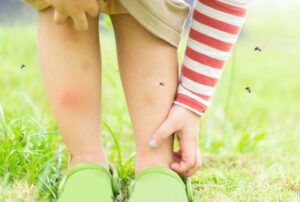
Patch Test for Sensitive Skin
- Plant-based compounds are powerful yet being natural. For those with sensitive skin or allergies, essential oils such as peppermint, eucalyptus, and citronella can result in dermatitis, redness, or itching. To find out if your skin will respond poorly, do a patch test.
- Performing a Patch Test:
- Combine one teaspoon of carrier oil (such as almond or coconut oil) with one or two drops of the essential oil.
- On the inside of your forearm, dab a small area with the mixture.
- Let it sit uncovered for a full day.
- Keep an eye out for any indications of burning, swelling, itching, or redness.
- The oil is probably safe to apply topically at the proper dilution if there is no reaction.
Dilution Guidelines for Essential Oils

- Expert Advice: Because essential oils are so potent, they should always be diluted before use.
- Direct application to the skin may result in long-term sensitisation, dryness, and burns.
- In addition to increasing safety, dilution makes the oil last longer and distribute more evenly throughout the skin.
- Dilution Ratios Suggested:
- Adults (General Use): 12–18 drops of essential oil per 30 millilitres of carrier oil, diluted by 2–3%.
- For kids over two, use a 0.5–1% dilution, or 3–6 drops per 30 millilitres of carrier oil.
- Avoid unless prescribed by a physician or licensed aromatherapist if you are pregnant.
- Almond, coconut, jojoba, and olive oils are examples of common carrier oils.
Best Time and Areas to Apply
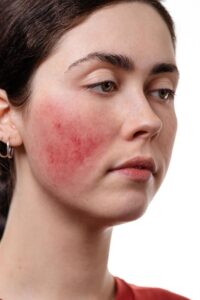
- Early morning and nightfall are when mosquitoes are most active. Before going outside, use repellents at least ten to fifteen minutes beforehand. Depending on perspiration, water exposure, and the life of the essential oil, reapply every two to three hours.
- Important Domains to Use:
- Mosquitoes frequently target the ankles and feet.
- behind the neck and ears
- Legs and arms (skin exposed)
- Steer clear of delicate spots including the lips, nose, eyes, and broken skin.
- Use the repellent on both skin and clothing for longer-lasting protection. To improve protection, essential oil blends can also be added to bed linens, socks, and scarves.
- Proper and regular application is key to the effectiveness of natural repellents.
- A safer, mosquito-free monsoon season can be achieved by combining topical application with environmental protection measures including screens, herbal candles, and mosquito netting.
Are Natural Repellents Safe for Kids and Pets?

- Although natural mosquito repellents are frequently advertised as “safe for everyone,” not all herbal remedies or essential oils are suitable for use with children or pets.
- Even natural chemicals can be dangerous if handled improperly, and the systems of babies, toddlers, and household animals are far more sensitive than those of adults.
- This section looks at ways to make natural repellents safer for the whole family, with a focus on young children and furry friends.
- Kid-Friendly Formulations:
- Compared to adults, children’s skin is thinner and more absorbent. Additionally, because their immune systems are still maturing, they are more vulnerable to allergic reactions and the toxicity of some essential oils. Children above the age of two should thus only use certain oils in lesser doses, according to paediatricians and licensed aromatherapists. Even natural topical insect repellents are not recommended for infants less than six months.
- Safe Oils for Children Ages 2 and Up:
- Lavender: soothing and kind to the skin
- Lemongrass: Very diluted, but effective
- Lemon eucalyptus is more potent than Radianta eucalyptus.
- Chamomile: Calms skin and softly wards off insects
- Children’s Dilution:
- Just 0.5% to 1% => That’s three to six drops for every thirty millilitres of carrier oil, such as almond or coconut oil.
- Parents who use kid-safe natural repellents instead of chemical ones report less irritation and skin rashes.
- For very young children, it is safer to apply the blend to the corners of the bed net or clothing rather than directly onto their skin.
- The American Association of Naturopathic Physicians (AANP) states that the most reliable oils for use in children’s personal care products, such as insect repellents, are lavender and chamomile.
Avoiding Toxic Oils Like Clove or Peppermint
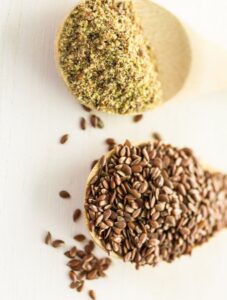
- Expert Opinion: Just because an essential oil is “natural” doesn’t mean it’s safe. Certain oils, like oregano, clove, peppermint, and cinnamon, are too harsh for young skin and might be poisonous if consumed or absorbed in excess.
- Why Steer Clear of These?
- Eugenol, which is found in cloves, can induce respiratory distress and liver damage in youngsters.
- Peppermint: Contains menthol, which irritates sensitive skin and may delay a baby’s breathing.
- Cinnamon: Extremely caustic; may result in allergic responses or burns.
- The Tisserand Institute strongly cautions against applying these oils to or around children less than six. Oils like peppermint and clove must be used very carefully near babies and pets, even when diffused.
Pet-Safe Essential Oils

- Pets, particularly dogs and cats, react to essential oils extremely differently than people do. Animals can be poisoned by certain oils that are harmless for humans, especially if they inhale, lick, or absorb them via their skin.
- Unsuitable for pets:
- The tea tree
- Cloves
- Citrus oils, such as orange and lemon
- A hint of cinnamon
- Mint pepper
- Dog-safe (when used sparingly):
- When diluted, lavender is harmless and calming.
- Cedarwood (only non-toxic species): mildly repulsive
- Geranium:
- May be applied to collars or bedding in small amounts.
- Safe Procedures:
- Don’t diffuse oils in enclosed areas where pets aren’t allowed to go.
- Avoid putting essential oils directly on your pet’s paws or fur.
- Only use pet-safe sprays on their collars or bedding, and only after patch testing.
Tips to Keep Mosquitoes Away During Monsoon
- Although the monsoon season provides much-needed respite from the heat, it also makes conditions ideal for an increase in mosquito populations.
- Applying repellents is not enough to protect your house and family; proactive prevention techniques are needed.
- Here are some tried-and-true, professional-backed strategies for naturally repelling mosquitoes during the rainy season.

- Prevent Water Stagnation
- Expert Opinion:
- The single most important element influencing mosquito reproduction during the monsoon season is stagnant water. Even a tiny puddle in a flowerpot tray or a clogged drain might serve as a breeding habitat for female mosquitoes, which lay their eggs in still water. Breaking the life cycle of mosquitoes begins with removing these water sources.
- Practical Advice:
- At least twice a week, empty and clean containers such as pet dishes, plant trays, and coolers.
- Always keep water tanks covered.
- To stop larvae from maturing, use kerosene or sand in outdoor drains.
- Repair leaks in garden hoses, air conditioners, and pipes.
- Just by routinely checking for standing water on rooftops, balconies, and backyards, many urban homeowners have observed a significant decrease in mosquito populations. Cleaning is only one aspect of it; another is developing a weekly routine.
- The National Vector Borne Disease Control Programme (NVBDCP) in India states that the best method of preventing mosquito-borne illnesses like dengue and chikungunya is source reduction, which involves eliminating standing water.
Use Window Screens and Mosquito Nets
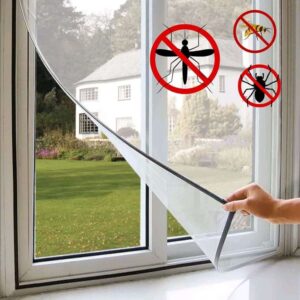
- When chemical repellents aren’t appropriate for kids or pets, physical barriers are still one of the safest and most efficient ways to keep mosquitoes out of your house. Nets and screens provide side-effect-free, round-the-clock protection.
- Methods of Implementation:
- Make sure there are no tears or gaps while installing mesh screens on windows and doors.
- For short-term protection, use velcro or magnetic mosquito netting.
- Always sleep beneath a mosquito net, particularly between the hours of 6 and 8 a.m. and 5 and 7 p.m.
- In regions where there is a greater risk of mosquito-borne illnesses, choose insecticide-treated bed nets (ITNs).
- Even in places that are prone to rain or have a high population density, families who frequently use bed nets have reported a sharp decrease in mosquito bites.
- Newborns and older family members who are more susceptible benefit most from it.
- The World Health Organisation (WHO) claims that mosquito nets have prevented millions of deaths worldwide, especially in nations where malaria is endemic.
- Nets are more than simply an adornment; they are an essential preventive tool.
Grow Mosquito-Repelling Plants like Tulsi, Marigold, and Mint

- Certain plants that release potent scents that mosquitoes find repulsive are examples of nature’s own mosquito repellents. These plants serve as living repellents all season long in addition to being aesthetically pleasing.
- The Best Plants to Grow:
- Holy basil, or tulsi, contains eugenol, which purifies the air and keeps insects away.
- Marigold: Pyrethrum, a naturally occurring insect repellent, is present in its aroma.
- Menthol, which is abundant in mint, interferes with mosquito scent receptors.
- Citronella and lemongrass are excellent for larger gardens or balconies.
- How to Employ Them:
- Put plants beside doors, windows, and balconies.
- Sometimes crush the leaves to release a more potent aroma.
- For added protection, mix with these plants’ essential oils.
- The careful placement of these herbs greatly reduces indoor mosquito activity, according to home gardeners and balcony plant enthusiasts. Additionally, they give interior air a natural scent and freshness.
- In controlled settings, tulsi, marigold, and mint effectively ward off Aedes mosquitoes, according to studies published in the Journal of Insect Science. These plants significantly aid in an integrated mosquito control strategy, yet they are not infallible on their own.
Best Practices to Combine with Repellents
- True protection during the monsoon season necessitates a mix of preventive measures and wise practices; using a natural mosquito repellent is just one part of the answer.
- Your repellant works much better when paired with thoughtful lifestyle decisions.
- For comprehensive protection against mosquito bites and vector-borne illnesses, follow these crucial, professionally supported best practices in addition to using repellents.
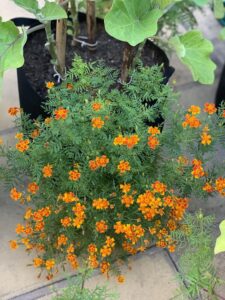
- Put on long sleeves and light-colored clothing.
- Professional Perspective:
- Did you aware that black clothing attracts mosquitoes? Because mosquitoes can detect movement and body warmth, dark colours like red, navy blue, and black absorb more heat and increase your visibility. Wearing loose-fitting, light-colored clothing decreases your visibility to these pests and acts as a physical barrier.
- The Reason It Works:
- Mosquitoes are physically prevented from reaching your skin by wearing long sleeves and trousers.
- Light hues make you less appealing to insects since they reflect heat and lessen body odour.
- On wet monsoon days, materials like cotton and linen are both breathable and protective.
- Even without overusing repellent, families that wear protective gear when doing outdoor tasks or taking evening walks frequently report fewer bites.
- For this exact reason, schools and childcare facilities frequently promote wearing light, full-sleeved attire during the rainy season.
- One of the best ways to prevent mosquito-borne illnesses like dengue and malaria is to wear long-sleeved shirts, pants and socks, ideally coated with natural repellents like lemon eucalyptus, according to the Centres for Disease Control and Prevention (CDC).
Use Natural Body Care Products Infused with Repellent Herbs

- You can also optimise your daily hygiene and skincare regimen to keep mosquitoes away. In addition to nourishing your skin, products containing herbs like citronella, tulsi, eucalyptus, and neem help deter insects.
- Functional product examples include:
- Body washes and soaps with citronella or neem extracts
- Herbal body oils including eucalyptus or lemongrass
- Body creams or face gels with lavender, peppermint, or tulsi
- Foot creams containing clove and mint (ankles are typically the focus of mosquitoes)
- A lot of consumers like natural remedies that provide both skin hydration and bug protection. Herbal-infused body care provides a kinder and more sustainable alternative to synthetic perfumes and creams, which can irritate the skin due to perspiration and humidity, particularly during the monsoon season.
- Customers may choose safer options for children and sensitive skin types when brands clearly label their products with ingredients and usage recommendations. Seek out solutions with a noticeable herbal content that are free of chemicals and parabens.
- The Ayurvedic Pharmacopoeia of India acknowledges neem, tulsi, and eucalyptus as natural insect repellents and skincare plants. When utilised properly, their presence in cosmetic formulas is regarded as safe and advantageous.
Reapply Every Few Hours for Full Protection
- In contrast to chemical repellents, natural repellents sometimes evaporate more quickly. The majority of essential oil-based treatments need to be reapplied to preserve their efficacy after two to four hours at most, particularly if you’re perspiring or in the rain.
- The best method:
- Particularly on exposed parts like the arms, legs, and ankles, reapply every two to three hours.
- Reapply even sooner after washing or after perspiring a lot.
- Remember the frequently disregarded areas of the neck, knees, and behind the ears.
- It’s easier to reapply when you’re at work, school, or on the commute if you have a spray or roll-on in your pocket. Additionally, longer-lasting results are obtained by layering protection (clothes + spray + net).
- No repellent provides long-term protection, according to the World Health Organisation. For natural formulae, timing and reapplication are crucial.
Recommended Natural Mosquito Repellent Products
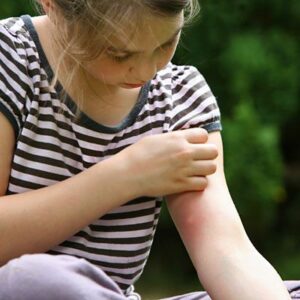
- Herbal Body Sprays:
- The most widely used and adaptable natural mosquito repellent is herbal. When prepared with the proper components, they are safe for everyday use, portable, and quick to apply. Usually diluted in water or alcohol, these sprays contain a mixture of essential oils like citronella, lemongrass, eucalyptus, peppermint, and lavender.
- Principal Advantages:
- repels insects on skin and clothing instantly.
- It can be used as a linen or room spray.
- non-greasy and quick to dry.
- Both indoor and outdoor use are OK.
- In addition to their defensive properties, many users say that sprays have a nice aroma and a cooling effect.
- They are particularly helpful when walking, gardening, or going to activities in the evening. Aloe vera and other calming components are even included in some herbal sprays to provide post-bite treatment.
- Always make sure it’s safe for kids and look for a minimum of 5% essential oil. Steer clear of sprays that use “fragrance” or “perfume” in place of actual oils.
- Seek certifications that guarantee product safety and transparency, such as FDA-approved, dermatologist-tested, or Made Safe labelling.
Natural Roll-Ons:
- Roll-ons are excellent for focused application, particularly in high-risk regions like the neck, wrists, and ankles. Because they evaporate more slowly than sprays, these products, which are usually oil-based, provide protection that lasts longer.
- Typical Components:
- Neem oil is calming and repellent.
- For maximum efficacy, use eucalyptus or lemon eucalyptus oil.
- Lavender and tulsi for a soothing scent and extra skin benefits.
- Because roll-ons are small, spill-proof, and don’t require full-body application, parents prefer them for school-age children. Additionally, they are ideal for office workers, commuters, and tourists who require protection without drawing notice.
- For best effects, apply just behind the ears and to pulse points. Do not apply to broken skin or close to the eyes.
Essential Oil-Based Creams
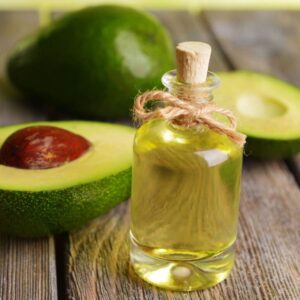
- Creams that repel mosquitoes have two advantages: they protect insects and nourish the skin. In addition to repellant essential oils like citronella, tulsi, and camphor, these creams frequently contain plant oils like coconut, almond, or shea butter.
- Why Opt for Creams?
- Great for sensitive or dry skin.
- Since there is no alcohol, irritation is less likely to occur.
- Longer skin adherence makes it suitable for usage at night.
- Perfect for children, especially when it comes to bedtime use.
- Creams are kinder than sprays or roll-ons for people with delicate or eczema-prone skin. In the humid yet draining monsoon season, many people report a moisturising effect.
- Always choose products with a noticeable herbal content that are devoid of parabens and sulphates. Creams containing natural preservatives, such as vitamin E or rosemary extract, are safer for the environment and for the skin.
- Ayurvedic doctors advise herbal lotions as a safer substitute for older people and infants older than six months. They are a component of a multi-layered protection strategy when combined with mosquito nets or diffusers of herbal remedies.
FAQS
1.Why are mosquitoes more active during monsoon?
Mosquitoes thrive in warm, humid environments with plenty of stagnant water — exactly the conditions that monsoon brings. Rainwater collects in open containers, clogged drains, and garden pots, creating ideal breeding grounds for mosquito larvae.
2. Are natural mosquito repellents really effective?
Yes. Natural repellents made with essential oils like citronella, eucalyptus, neem, and lemongrass have proven insect-repelling properties. While their effect may not last as long as chemical ones, regular reapplication provides effective protection without harmful side effects.
3. How often should I reapply a natural mosquito repellent?
Most natural repellents need to be reapplied every 2 to 3 hours for best results, especially after sweating, bathing, or exposure to rain. Unlike synthetic repellents, essential oils evaporate faster and require consistent use.
4. . Can I use essential oils directly on my skin?
No. Essential oils must be diluted with a carrier oil like coconut, almond, or jojoba oil before applying to skin. Direct application can cause irritation or allergic reactions, especially on sensitive skin.
5. Which essential oils are safe for kids?
For children over 2 years old, safe oils include lavender, chamomile, lemon eucalyptus (radiata), and lemongrass — all properly diluted. Avoid using peppermint, clove, or undiluted eucalyptus oils on children.
6. Are natural repellents safe for pets?
Use caution. Many essential oils like tea tree, peppermint, and clove are toxic to cats and dogs. Stick to pet-safe oils like lavender and cedarwood (in low concentrations), and avoid diffusing oils in enclosed spaces around pets.
7. How can I prevent mosquitoes from breeding near my home?
Clear stagnant water regularly from flower pots, drains, birdbaths, and AC trays. Cover water tanks, unclog gutters, and keep your surroundings dry and clean. Even a spoonful of water can host mosquito larvae.
8. What plants can I grow to repel mosquitoes naturally?
Plants like tulsi (holy basil), mint, lemongrass, citronella, lavender, and marigold naturally emit scents that mosquitoes dislike. Placing them near doors, windows, and balconies helps keep bugs away.
9. Can I make my own mosquito repellent at home?
Yes! You can make a DIY spray by mixing distilled water with 20–30 drops of citronella, neem, or eucalyptus essential oil, plus a little witch hazel or alcohol as an emulsifier. Shake well and use on skin or fabric after patch testing.
10. Is it safe to use mosquito-repellent candles or incense indoors?
Natural candles made with citronella or soy wax are generally safe. Herbal incense made with neem or camphor is also effective, but always ensure good ventilation. Avoid synthetic coils or incense with chemical additives indoors.
